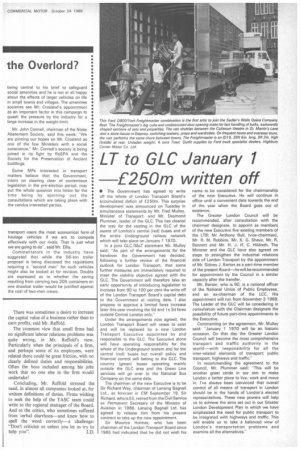LT to GLC January 1 .1250m written off
Page 21

If you've noticed an error in this article please click here to report it so we can fix it.
• The Government has agreed to write off the whole of London Transport Board's accumulated deficit of £250m. This surprise development was announced on Tuesday in simultaneous statements by Mr. Fred Mulley, Minister of Transport, and Mr. Desmond Plummer, leader of the GLC. This has cleared the way for the vesting in the GLC of the assets of London's central (red) buses and of the entire Underground railway network which will take place on January 11970.
In a joint GLC/MoT statement Mr. Mulley said; "As part of the arrangements for the handover the Government has decided, following a further review of the financial outlook for London Transport, that some further measures are immediately required to meet the viability objective agreed with the GLC. The Government will therefore take an early opportunity of introducing legislation to increase from 90 to 100 per cent the write off of the London Transport Board's capital debt to the Government at vesting date. I also propose to approve a limited fares increase later this year involving the 9d and Is 3d fares outside Central London only."
Under the arrangements now agreed, the London Transport Board will cease to exist and will be replaced by a new London Transport Executive appointed by and responsible to the GLC. The Executive alone will have operating responsibility for the whole of the Underground system and for the central (red) buses but overall policy and financial control will belong to the GLC. The country (green) buses operating mainly outside the GLC area and the Green Line services will go over to the National Bus Company on the same date.
The chairman of the new Executive is to be Sir Richard Way, chairman of Lansing Bagnall Ltd., as forecast in CM September 19. Sir Richard, who is 55, retired from the Civil Service as Permanent Secretary of the Ministry of Aviation in 1966. Lansing Bagnall Ltd. has agreed to release him from his present contract to take up the new appointment.
Sir Maurice Holmes, who has been chairman of the London Transport Board since 1965 had indicated that he did not wish his name to be considered for the chairmanship of the new Executive. He will continue in office until a convenient date towards the end of the year when the Board goes out of existence.
The Greater London Council will be recommended, after consultation with the chairman designate, to appoint as members of the new Executive five existing members of the LTB; Mr Anthony Bull, (vice-chairman), Mr. R. M. Robbins, Mr. K. G. Shave, Mr. R. Bennett and Mr. H. J. H. C. Hildreth. The Minister and the GLC have also agreed on steps to strengthen the industrial relations side of London Transport by the appointment of Mr. Sidney J. Barton as a part-time member of the present Board—he will be recommended for appointment by the Council in a similar capacity after the transfer.
Mr. Barton, who is 60, is a national officer of the National Union of Public Employees, and an ex-chairman of the LCC. His appointment will run from November 3 1969. The Leader of the GLC will be considering in consultation with the Chairman designate the possibility of future part-time appointments to the Executive.
Commenting on the agreement, Mr. Mulley said: "January 1 1970 will be an historic occasion. On that day the Greater London Council will become the most comprehensive transport and traffic authority in the world—with responsibility for all the inter-related elements of transport; public transport, highways and traffic."
In recommending the agreement to the Council, Mr. Plummer said: "This will be another great stride in our aim to make London a better place to live, work and move in. I've always been convinced that overall control of all means of transport in London should be in the hands of London's elected representatives. These new powers will help us to achieve the aims set out in our Greater London Development Plan in which we have emphasized the need for public transport to be integrated with highways and traffic. This will enable us to take a balanced view of London's transportation problems and examine all the alternatives."




















































































































